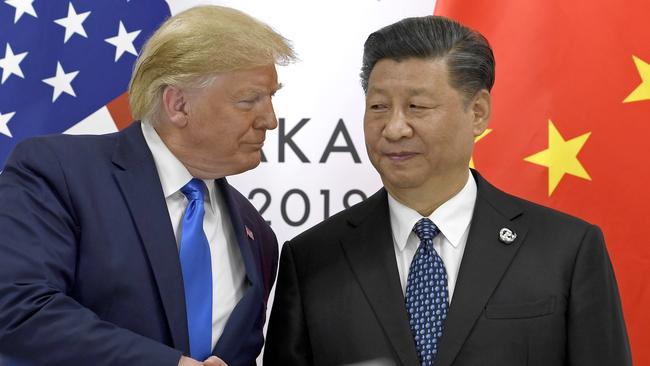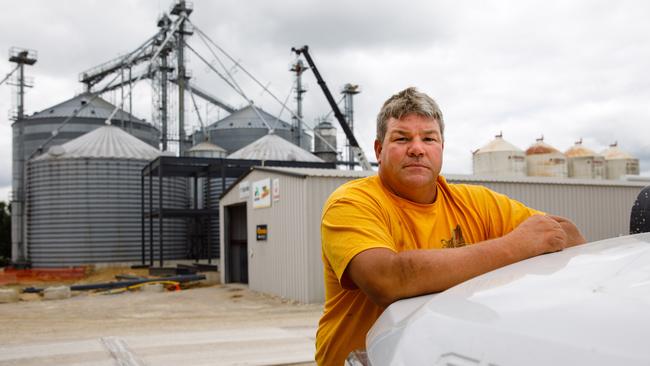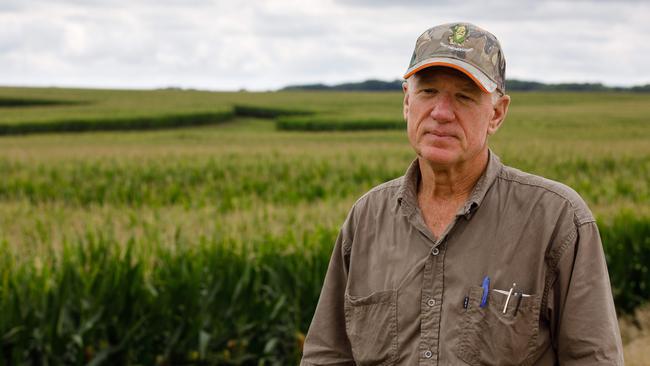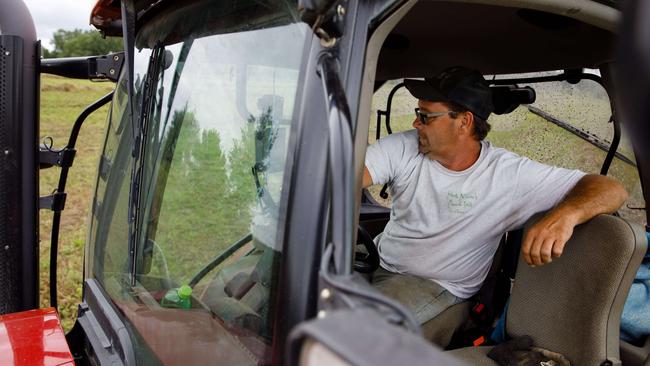China’s heartland attack
No one is feeling Donald Trump’s trade war more than US farmers.

Farmer Kirk Anderson uses a calculator at the Cedar County Farmer’s Co-operative in eastern Iowa to work out what Donald Trump’s trade war with China has cost him.
Eventually the burly father of two calculates the final figure and shakes his head in dismay.
“In the past 12 months I’ve lost $US84,000 ($125,000),” says Anderson, 44, who farms soybeans and corn in this midwest American heartland. “You know, I think they started this war with China for the right reasons. Let’s play fair was all we were asking with China.
“I was willing to give up something in this trade war to make things better in the future.
“But did we know it was going to drag on for a year and a half? I mean, you can take a hit for a while but you can’t sustain it.”
Anderson says that with his two children approaching college age, and with the price of his soybeans plumbing new depths, he’s not sure he can afford to keep copping such large losses. “I voted for Trump in 2016,” Anderson tells The Australian. “Will I vote for him again? Maybe. I’ll see what the other candidates can offer.”

But the other candidates would be Democrats. Anderson, like up to 75 per cent of America’s farmers, cast their vote for Trump in 2016 and most have only ever voted Republican. Now the loyalty of this diehard conservative constituency is being tested like never before as farmers in the US bear the biggest brunt of a trade war that shows no signs of ending.
For now most seem to be sticking with Trump despite the hip-pocket pain the retaliatory tariffs from China on soybeans and other products have caused them. But this soon could change without a resolution to the trade war.
President sows doubt
The three key swing states Trump must win to be re-elected next year are Wisconsin, Michigan and Pennsylvania. Each is stocked with farms. If even a small number of farmers abandon Trump because of the trade war, his chances of a second term in the White House will plummet.
The situation for farmers worsened significantly this month after China announced it would no longer buy agricultural products from the US. Beijing announced the move in retaliation for Trump’s pledge to slap 10 per cent tariffs on $US300 billion on Chinese imports. If China follows through on this threat, it would cost farmers a further $US9.2bn in agricultural exports to China — the amount the US exported to that country last year.
Trump compounded the confusion over the tit-for-tat trade war that has upset allies and raised market fears that the world economy will tip into a recession.
At the G7 Summit in France on Sunday, Trump was asked if he had second thoughts.
“Yeah, sure. Why not?” he said.
The reporter repeated the question and Trump replied: “Might as well. Might as well.” A second reporter followed up again, asking if he had second thoughts about escalating the trade war.
“I have second thoughts about everything,” Trump responded.
The White House scrambled to explain. “His answer has been greatly misinterpreted. President Trump responded in the affirmative because he regrets not raising the tariffs higher,” spokeswoman Stephanie Grisham said.
Mobile users click here for pdf.
Trump blinked for the first time in the dispute when he said recently he would delay until later this year planned new tariffs on some Chinese consumer products.
Trump’s move is a tacit admission that Americans are being hurt by tariffs.
It exposes the growing weakness of his negotiating position in the trade war as global indicators are pointing to an economic slowdown and even the possibility of a recession in the US.
No one is being hurt by this tariff war with China more than US farmers, especially those producing soybean, pork and dairy.
“(It is a) body blow to thousands of farmers and ranchers already struggling to get by,” says Zippy Duvall, president of the American Farm Bureau Federation.
In 2017 China imported $US19.5bn in US farm goods but that has slumped to $US9.2bn because of China’s retaliatory tariffs. US soybean exports to China are down by about 70 per cent.
Farming grants
Trump is aware of the pain farmers, who he calls “our great patriots”, are going through and the political risks this holds for him.
The President has approved two huge rounds of aid for US farmers, expected to total $US28bn when fully paid. He says there may be more.
“As they have learned in the last two years, our great American farmers know that China will not be able to hurt them in that their President has stood with them and done what no other president would do. And I’ll do it again next year if necessary!” Trump tweeted.
He has told farmers they will be “one of the biggest beneficiaries” of his administration’s attempts to get China to play fair on trade, protect US intellectual property, end subsidies to Chinese state-owned entities and improve access to Chinese markets.
Meanwhile China is doing all it can to ensure that the trade war hurts Trump politically, targeting tariffs at farmers in US states that Trump needs to win next year.
Hu Xijin, editor of China’s state-controlled newspaper the Global Times, says US farmers should blame Trump, not Beijing, for their woes.
“China has no motive to hurt US farmers, it is the current US administration that is hurting them,” Hu tweeted. “I believe US farmers are not fools. They can tell whether the administration is doing good to them, or sacrificing farmers’ interests for its political ambition.”
Torn by Trump
Farmer Kirk Lieser is perched on top of a Mack truck near Picton, Iowa, helping guide a funnel to pour corn from a huge container into the back of the truck. The 62-year-old, who has farmed soybeans and corn all his life, finishes the job, rips off his protective face mask and ponders how he feels about the trade war.
Lieser is a loyal Republican but he is torn about Trump’s tariff trade war. His farm has lost almost $US300,000 as soybean prices plummeted.
Lieser says he has received only half of this back from the government in the form of farm aid.

“You can’t trust what Trump is going to do,” he says.
“He says he is going help you on one hand and then he does something backwards, so you just don’t know.
“Our prices are very poor and Trump has given us some payments to try to make up for that, but at the same time he just gave 39 refineries waivers so they don’t have to use ethanol, which is made from corn — so he is giving it to us with one hand and stabbing us in the back with the other.
“But the thing is that I hate China more than Trump. China is our enemy. They’ve been screwing us a long time and the trade war is the only weapon we have against China. They are crooks and they don’t understand anything but force and money.”
Lieser says Trump should not be blamed for taking on China now because the US congress should have done so decades ago.
Like many Republican farmers, Lieser says he probably will vote for Trump again despite the economic pain he caused. The alternative of a Democrat president is more frightening to him.
“Gun rights is a big issue for me. Also, I don’t like abortion or socialist medicine (universal healthcare),” he says. “You can’t be a Democrat any more unless you are a socialist.
“Unlike in your country (Australia) we will never give the government our guns because then they will take everything in time and that is what is going to happen if the Democrats get in.”
‘This is not fun’
A short drive from Lieser’s farm, father of four Earl Bikel, 47, is driving his tractor across his soybean farm.

Bikel is a Republican but says he doesn’t like the damage Trump has inflicted on farmers.
“I don’t agree with their farm policies — it has affected me a lot,” says Bikel, whose children are aged between four and 10. “Our family can’t afford those little trips and holidays any more. We can’t do that right now. I can’t see any quick solution to it either.”
In eastern Iowa near Tipton, Jaro Hora, 82, is driving a lawn tractor around his small farm of soybeans and corn.
Hora says he didn’t vote for Trump in 2016 and the trade war has ended any prospect he will back him next year.
“So long as we are doing that to China and they are retaliating with tariffs, it is costing people more money to buy things. So it’s costing Americans money and I’m not happy about that,” he says.
Polls show that despite growing concerns among farmers about the impact of the trade war, most of them still believe the trade fight will be resolved in a way that benefits US agriculture.
But after 12 sets of trade talks, the Trump administration and China do not seem any closer to striking a deal, with many pundits predicting there will be no deal before the US election in November next year.
Trump has accused China of trying to wait it out in the hope that a Democrat president is elected.
For now most farmers appear to be sticking by Trump, but as the trade war drags on and the political risk grows, his most loyal supporters question how much they are willing to lose.
“We are not making any money, our balance sheets are going backwards but not very many are selling out of their farms yet,” says Lieser.
“But I suspect this year will change that because it’s not financial. It has just been a terrible, terrible year. I don’t even like farming any more.
“I am sick of it. This is not fun.”
Additional reporting: Reuters




To join the conversation, please log in. Don't have an account? Register
Join the conversation, you are commenting as Logout